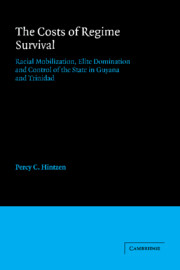 The Costs of Regime Survival
The Costs of Regime Survival Published online by Cambridge University Press: 08 October 2009
The approach that has been employed in the foregoing analysis of Guyana and Trinidad and Tobago is similar to what Samuel P. Huntington (1971: 319–21) calls the “crisis” model of political change. It emphasizes the choices made by a political leadership in the quest to gain and maintain control of the state. It subscribes to the notion, argued by Rustow (1970: 337–63), that the conditions for conquest of power are different from those necessary to ensure political tenure.
Political leaders in LDCs can come to power by directly representing the interests of powerful and strategic actors who are dissatisfied with the existing state of affairs and/or by making alliances with them. In this manner, they can assure themselves of access to resources for use against the political incumbents. These resources vary and can include sheer numbers, financial power, economic control, coercive resources, propaganda, and the like. They can be located in both the domestic and international environments.
To remain in power, the incumbent regime must seek to accommodate dissident actors, either by giving them direct control of political decision-making or by formulating policy to meet their demands, or it must seek to neutralize them. The object of neutralization is to insulate the political, social, and economic systems from the effects of negative and destabilizing actions or to insulate the regime itself from the consequences of such actions.
International actors
International actors can pose the most formidable threat to the stability of regimes in LDCs.
To save this book to your Kindle, first ensure [email protected] is added to your Approved Personal Document E-mail List under your Personal Document Settings on the Manage Your Content and Devices page of your Amazon account. Then enter the ‘name’ part of your Kindle email address below. Find out more about saving to your Kindle.
Note you can select to save to either the @free.kindle.com or @kindle.com variations. ‘@free.kindle.com’ emails are free but can only be saved to your device when it is connected to wi-fi. ‘@kindle.com’ emails can be delivered even when you are not connected to wi-fi, but note that service fees apply.
Find out more about the Kindle Personal Document Service.
To save content items to your account, please confirm that you agree to abide by our usage policies. If this is the first time you use this feature, you will be asked to authorise Cambridge Core to connect with your account. Find out more about saving content to Dropbox.
To save content items to your account, please confirm that you agree to abide by our usage policies. If this is the first time you use this feature, you will be asked to authorise Cambridge Core to connect with your account. Find out more about saving content to Google Drive.